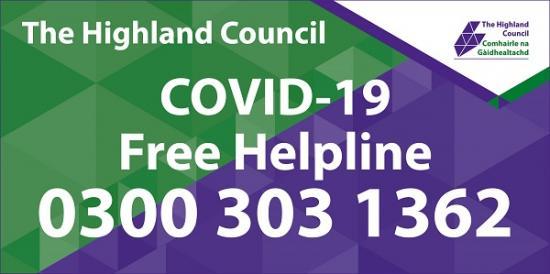Calls continue to come in to Council's Covid-19 helpline
9th April 2020

A high number of calls to The Highland Council's dedicated COVID-19 helpline continue to be dealt with on a daily basis.
The 0300 303 1362 has been set to give assistance on urgent COVID issues and to collect details of individuals and community groups looking to provide volunteering support.
There is a separate helpline for anyone who receives a Shielding letter from the NHS requiring them to self- isolate for 12 weeks. This is 01349 886669 and if they require urgent help with food or medicine, they should telephone the number provided in their letter
On average we are now dealing with 200 calls a day to our COVAID-19 helpline. In total council staff and volunteers from Eden Court have dealt with just short of 3000 calls since the launch on 25th March. The majority of these calls have been about seeking support for businesses, along with enquiries about how to volunteer
The Helpline is normally open between 8am and 6pm Monday to Friday but for to the Easter holiday weekend the hours tomorrow (Friday 10 April) and Monday 13 April will be 10am - 4pm. All calls are free.
The Council is reminding people that they can use the online forms to make payments, report problems and request a service 24 hours a day, 7 days a week. These can be accessed by visiting www.highland.gov.uk or other urgent Council business by telephoning 01349 886602.
To make a payment visit https://www.highland.gov.uk/pay
To report a problem visit https://www.highland.gov.uk/report
To request a service visit https://www.highland.gov.uk/request
For further information, latest coronavirus developments and changes to key Council services visit www.highland.gov.uk/coronavirus
Related Businesses
Related Articles
Council welcomes Visitor Levy flexibility plan
The Highland Council welcomes moves by the Scottish Government to introduce greater flexibility on how it could design a Visitor Levy Scheme for consultation. The Visitor Levy (Scotland) Act 2024 currently provides local authorities with discretionary powers to implement percentage-based levies following statutory consultation.Highland Council is reaching out for views to shape its next 26/27 budget.
As it looks to set out its forthcoming priorities, the council is seeking involvement from members of the public, including businesses, community groups, parents, and young people. All their opinions are going to be crucial in deciding how Highland Council will take on its budget challenge for 2026-2027.Have your say in Thurso's future £100million investment by attending public consultation events
Thurso is to benefit from £100m investment in education and community facilities and are rolling out the first phase of public consultations on 9 and 10 December 2025. The Highland Council is inviting people that live, work, or study in Thurso, to come along to the public consultation events to have their say; this is an opportunity to help shape the future of Thurso, to gather views and ideas.Finding new owners for empty homes - Scheme launched to help return more empty homes to active use
A new online portal has been launched to bring empty homeowners together with prospective buyers or developers with the aim of facilitating more properties to be used as homes again. Covering the whole of Scotland, this builds on the success of local pilots, referred to as "matchmaker schemes".Consideration for short term let control area in Skye and Raasay
Steps towards introducing a short term let control area have been considered by Highland Council's Isle of Skye and Raasay area committee. On Monday (1 December 2025) the committee heard evidence to justify the grounds for the introduction of a Short Term Let Control Area covering all or part of Skye and Raasay.Workforce North event spotlights Highland economy
EMPLOYERS and educators from across the Highlands have gathered to hear how a new initiative is aiming to transform the region's economy. Workforce North - A Call to Action brought together business leaders and teachers from primary and secondary schools from across the Highland Council area with a wide range of partners geared towards education, learning and skills development at Strathpeffer Pavillion.
Council calls for meaningful engagement from Home Office Over 300 Asylum Seekers Being Sent to Inverness
The Highland Council continues to call for meaningful engagement from the Home Office over its plans to temporarily accommodate up to 300 adult male asylum seekers at Cameron Barracks, Inverness. It follows an email on Monday from Alex Norris MP, Minister for Border Security and Asylum, to Council Leader, Raymond Bremner, which failed to answer questions raised by the Council or address community concerns.SSEN Transmission becomes first signatory to Highland Social Value Charter
SSEN Transmission has become the first company to sign up to the Highland Social Value Charter (HSVC), marking a significant milestone in delivering long-term socio-economic benefits for communities across the Highlands. Investment commitments from the company include funding for roads, new homes, jobs, and work for local contractors in addition to a local and regional fund for communities to apply to.Wick - Aberdeen PSO - Update issued 24/11/2025
The Highland Council continues to work through the procurement process for the provision of the Wick Public Service Obligation for the Highland Council. We have now entered the preferred bidder stage and have entered a standstill period.Highland Council winter road condition and school closure report for 25 November 2025
Maps of the Council's gritting routes by priority and policy are available online at www.highland.gov.uk/gritting (external link) The information provided is a summary of reports from operational staff and is intended to give a general indication of typical conditions in each area at a point in time. It is not intended to imply that any individual route is entirely snow and ice free and drivers must be aware that conditions can change rapidly and make their own assessment of conditions for travelling.
